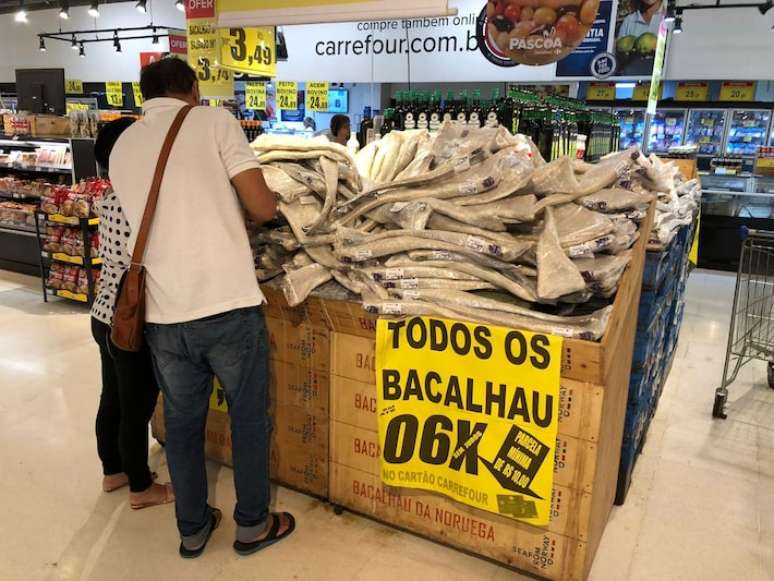Rising prices and high defaults are obstacles to consumption; Those who choose to pay in installments will be able to pay the last installment of the Easter egg only after Christmas
A Easter This year will be the episode. Large retail chains pay in installments for typical holiday items, such as chocolate eggs, cod, olive oil, sweets, sparkling wines, wines, chocolates and toys. Everything can be split on your credit card and interest-free. And the deadlines go up to ten times. This means that those who choose this payment method will pay the last installment of the Easter egg only after Christmas.
Debt e default still high and food prices still high, due to the increases recorded in recent years, despite the recent cooling of inflation In general, they explain the stores’ investment in longer terms to increase sales on that date.
A Americans, for example, which before the request for judicial recovery at the beginning of 2023 positioned itself on the market as responsible for the largest Easter in the world, pays in ten installments, without an increase, for purchases of Easter eggs, chocolates and imported toys, such as bunnies plush. The condition applies to purchases in physical stores and provides that the minimum value of the items purchased is R$ 199. Payment can be paid in installments on all credit cards, the company informs.
Already inside Carrefour, the largest supermarket chain in the country in terms of sales, the duration is shorter, up to six interest-free installments and on the store card. The difference is that the retailer places unusual items in the basket of products that can be paid for in installments, such as olive oil and cod.
According to the company, installments are nothing new. “For more than five years, Carrefour has offered the possibility of paying for Easter purchases in installments,” reads the note.
OR GPAnetwork controller Sugarloaf AND Extra market, informs that the installment plan included chocolates, Easter eggs, cakes, semifreddos, olive oils, wines, cod and the ready-made Easter lunch menu, available at the takeaways of both chains. By dividing the fee for purchases in São Paulo stores, the group expects to increase sales of chocolates and fish by 20%, it said in a statement.
Under the Pão de Açúcar banner it is possible to split the payment into up to four interest-free installments, with a minimum installment of R$100, on the Pão de Açúcar card. With Extra the payment is up to six interest-free installments on the brand’s card and three installments on other cards. The minimum installment is R$100.
The business strategy of spreading payments over long periods of time for Easter items satisfies the consumer’s desire. National survey carried out last month by National Confederation of Shop Managers (CNDL), in collaboration with SPC Brasilreveals that Brazilians want more time to shop at Easter this year.
According to the online survey that consulted almost a thousand consumers, the average number of installments requested by consumers for Easter purchases increased from three to four between 2023 and 2024. According to the research, the largest increase per installment is in the deadlines longer.
In the 2023 survey, for example, 9.3% of respondents said they would choose to split the payment into five installments. This year that share rose to 12.6%, an increase of 3.3 percentage points. Installment payments in six or more installments were the payment method chosen last year by 13.9% of respondents. This year this range has risen to 15.7%.
El Niño effect
Although the country’s overall inflation has lost momentum in recent months, the high price level of Easter items, such as chocolate and olive oil, are some of the factors that explain this, according to Daniel Sakamoto, executive director of the CNDLthe increased demand for longer payment terms.
According to General Consumer Price Index (HICP)-15the anticipation of the country’s official inflation, in the 12 months up to March the price of olive oil increased by almost 50% (46.43%), underlines the Brazilian Institute of Geography and Statistics (IBGE) .
An investigation by the Procon Foundation in the city of Sao Paulo reveals that the average price per kilo of chocolates increased this year at Easter by 8.30% compared to last year. In the case of tablets, in the same period, the increase was 8.30%. A kilo of chocolate eggs costs 15.52% less.
According to an analysis by financial markets platform Investing.com, Easter eggs were produced when the price of cocoa for contracts expiring in November and December ranged between $3,500 and $3,800 a ton on the New York Stock Exchange. The platform points out that a year ago the cocoa futures contract was trading at around $2,900 a ton. But last Monday, the 25th, the cocoa futures contract, whose delivery was scheduled for May, closed at $9,649 a ton.
The surge in olive oil and cocoa prices reflects the climatic adversities caused in the producing regions due to the El Niño phenomenon. Ivory Coast and Ghana are the world’s largest cocoa producers, accounting for around 60% of the supply, the platform’s analysts wrote in a report. Drought followed by excessive rains damaged the production of the commodity.
Sharing food?
For Sakamoto, of the CNDL, there is a dichotomy between the macroeconomic scenario and the personal finances of Brazilians. This explains the greater demand for long-term installments, including food products.
“From a macroeconomic point of view, the scenario today is better than last year, interest rates are lower, inflation is under control, unemployment is falling”, he observes. However, family finances remain strained, reflects the CNDL leader.
According to the body, there are currently 66.64 million defaulting Brazilians in the country, or 40% of the country’s adult population. “We have been at a level above 60 million delinquent debtors for almost a year, with very small seasonal variations,” he says. Sakamoto. Household debt is also high: it is higher than last year and increased by 0.5% from February to March this year, according to research by the CNDL.
It is precisely in this context that long-term installments bring relief to families. However, according to Sakamoto, in the medium term this ends up becoming a trap for the consumer.
“We know that a large part of the population does not have a good financial education,” he says, recalling that most only calculate whether the payment amount is within their pockets, but do not consider the addition of interest to the total amount. He says he believes this could have a negative impact on the economy.
Since there are people with little money in their pockets and who don’t want to stop shopping on commemorative dates, they end up getting into more and more debt. “There are certainly many people who are still paying for their Christmas shopping and who will soon be purchasing their Mother’s Day gifts in installments.”
Source: Terra
Ashley is a professional author and journalist, working at 247 News Update. She writes on various topics from economy news to general interest pieces, providing readers with relevant and informative content. She brings a unique perspective and in-depth analysis to her work.



